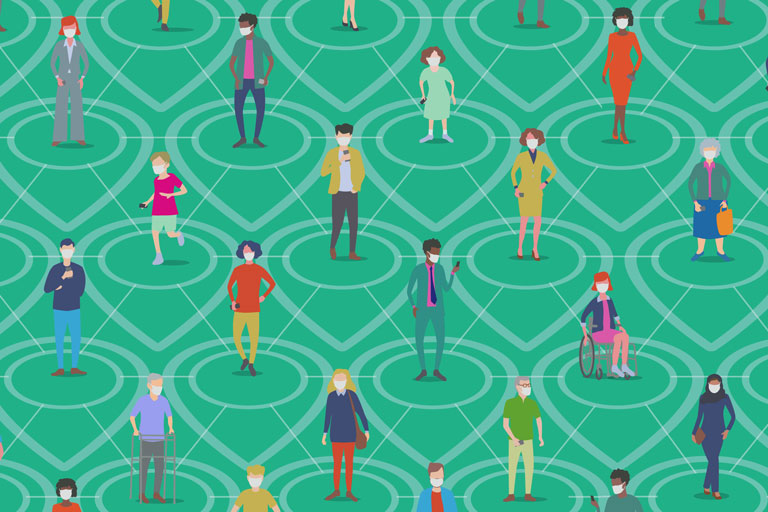The Indiana University Fairbanks School of Public Health at IUPUI will hire, train and manage over 300 contact tracers to track the spread of COVID-19 in Indianapolis through Dec. 31.
In collaboration with Indianapolis Mayor Joe Hogsett and Dr. Virginia Caine of the Marion County Public Health Department, the Fairbanks School received $10.5 million to expand contact tracing in the city. This funding is part of the nearly $80 million allocated by the City-County Council in June for programming aimed at helping residents impacted by COVID-19.
Contact tracing tracks the person-to-person transmission of an infectious pathogen like SARS-CoV-2, the novel coronavirus that causes the disease COVID-19.
"The Fairbanks School of Public Health is uniquely positioned for this endeavor," said Paul K. Halverson, the school's founding dean. "Our ties to the Indianapolis community, coupled with the expertise of our public health practitioners, bring together the skills in project development, implementation, quality improvement, monitoring and evaluation that are necessary for this project to be successful."
The school will hire both remote and field-based contact tracers, along with their supervisors, who will act as team leads for the contact tracers.
"Over the last several months, we have seen Indianapolis residents, businesses and organizations make sacrifices in order to combat the spread of COVID-19," Hogsett said. "Increasing our ability to quickly and effectively engage in contact tracing can help us to preserve the progress we have made and better address outbreaks when they do occur. Indianapolis is lucky to have the Indiana University Fairbanks School of Public Health at IUPUI as a partner in this program, providing their expertise, capacity and ability to quickly scale to address this critical moment."
"We are proud to participate in this innovative partnership with the city of Indianapolis and the Indiana University Fairbanks School of Public Health at IUPUI to ramp up contact tracing efforts and help reduce the spread of COVID-19 in Marion County," said Caine, director of the Marion County Public Health Department and a Bicentennial Professor and associate professor of medicine at the IU School of Medicine.
What is contact tracing?
When a person tests positive for the novel coronavirus, a trained contact tracer will begin communicating with the infected individual to begin the process of tracing everyone with whom they may have had close contact. Close contacts include those who were within 6 feet of the infected individual for at least 15 minutes. The tracking period begins after an individual has been exposed to an infected individual.
Once everyone who may have had close contact with an infected individual has been identified, the contacts are informed of their potential exposure -- while maintaining the anonymity of the person who might have exposed them.
"The faster we can accomplish contact tracing, the fewer people will need to be quarantined," said Shandy Dearth, principal investigator on the contract and director of undergraduate epidemiology education at the Fairbanks School. "We encourage people who have been exposed to someone who tests positive for the novel coronavirus to quarantine themselves to minimize transmission of the virus."
The contact tracers will also help connect people infected with the virus to community resources such as food pantries, which might be needed to help quarantined individuals follow social-distancing guidelines.
Reducing health inequities
Dearth said that although many companies have developed apps that notify individuals when they have been within 6 feet of a known case, using real people for contact-tracing work helps provide equitable access to health information and resources.
For example, without adequate contact tracing, the transmission of COVID-19 could be amplified in homeless shelters, which serve a population that lacks access to technology, she said.
"If we relied only on technology, it would create another barrier for those who have been hardest hit by the disease: people living in poverty, African Americans, Latinx communities and others," Dearth said. "Person-to-person contact tracing may prevent a strong acceleration of disease -- especially in urban settings like Indianapolis, where the population is denser in smaller geographic areas, which makes social distancing more difficult."
Indianapolis is also home to many immigrants and non-English-speaking communities. So along with speaking another language, contact tracers might need to be familiar with different methods of communication, including body language and customs.
The contact-tracing team will make initial contacts by phone, but this might not be possible in all areas of the city. Contacts who cannot be reached by phone will be contacted through field work.
How to apply
The Fairbanks School of Public Health will be recruiting both part- and full-time contact tracers. Many of the part-time positions will be remote and filled by students enrolled in IU's public health, medicine, nursing and social work programs. Remote contact tracers will reach out to individuals by phone.
Full-time, field-based contact-tracing positions will be filled by trusted, culturally competent community members who represent diverse populations and will ideally be fluent in Spanish, French, Burmese or Russian.
All positions will be posted on the Jobs at IU website once available.
Email covidct@iu.edu with all questions about contact tracing.


